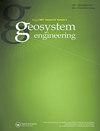Neutralization of acidic soil using Myxococcus xanthus: Important parameters and their implications
IF 1.1
Q3 GEOSCIENCES, MULTIDISCIPLINARY
引用次数: 2
Abstract
ABSTRACT Soil acidification through acid rain/deposition has been a serious problem that adversely affects the soil environment. In this study, Myxococcus xanthus, myxobacteria, was assessed towards neutralization of artificial acidic soil. Differences in initial pH and peat moss content in soil with incubated M. xanthus were being compared using a one-variable-at-a-time approach. It showed that the M. xanthus could neutralize the acidified soil using their specific metabolism, producing ammonium ions and hydroxide simultaneously. Increasing peat moss content could direct the neutralization performance of M. xanthus towards inhibition whereas reducing the peat moss content could improve the neutralization performance. Among experimental parameters such as initial pH, peat moss content in soil, and microorganism concentration, the interaction of soil amount either with peat moss content or microbial population density was meaningfully correlated to the neutralization of acidic soil.黄粘球菌中和酸性土壤的重要参数及其意义
摘要酸雨/沉积引起的土壤酸化一直是一个严重的问题,对土壤环境产生不利影响。在本研究中,对粘细菌黄粘球菌对人工酸性土壤的中和作用进行了评估。使用一次一个变量的方法比较了培养的黄杨土壤中初始pH值和泥炭苔含量的差异。结果表明,黄嘌呤可以利用其特定的代谢作用中和酸化土壤,同时产生铵离子和氢氧根。增加泥炭苔含量可使黄嘌呤的中和性能向抑制方向发展,而降低泥炭苔含量则可提高中和性能。在初始pH、土壤中泥炭苔含量和微生物浓度等实验参数中,土壤量与泥炭苔含量或微生物种群密度的相互作用与酸性土壤的中和作用有显著相关性。
本文章由计算机程序翻译,如有差异,请以英文原文为准。
求助全文
约1分钟内获得全文
求助全文

 求助内容:
求助内容: 应助结果提醒方式:
应助结果提醒方式:


